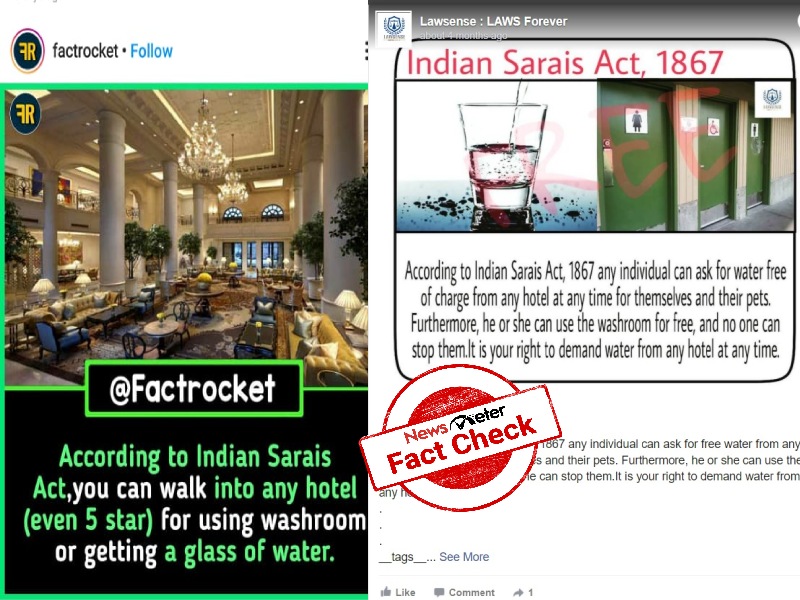Claims that Sarais Act allows any individual to use washroom of any hotel free are TRUE
By Satya Priya BN
Hyderabad: Finding a clean restroom during long-distance travel is a difficult task and venturing into a hotel to use their facilities, if we are not their customer, can be very humiliating sometimes.
But Newsmeter found a message being circulated on social media stating that there is a law in India formed in 1867, according to which any person can directly use the washroom in any hotel and ask for free water and no one can stop them.
A picture shared on Facebook recently, claims that "According to Indian Sarais Act 1867, any individual can ask for free water from any hotel at any time for themselves and their pets. Furthermore, he or she can use the washroom for free and no one can stop them. It is your right to demand water from any hotel at any time."
The same message was shared by several users on Twitter including Praveen Kaswan, Forest Officer.
Archived links can be found here and here.
Fact Check:
The claim that according to the Sarais Act 1867, any individual can walk into any hotel washroom and ask for free water, no one can stop them is TRUE.
The Sarais Act 1867 is the Act enjoined upon a keeper of Sarai or an inn to keep a certain quality of water fit for "consumption by persons and use of it by the animals" to the satisfaction of the district magistrate or his nominees.
The Sarais Act 1867 required Sarais (lodges) to provide free drinking water for persons and for animals too and toilet facilities to the public. The Act is used to harass hotel owners, as indicated by recent news reports. For instance, a hotel in Delhi was harassed because it did not offer free drinking water to passersby, as required under the Sarais Act.
Every hotel, restaurant, and "eatery" has been directed to grant open access to all citizens, irrespective of whether they are customers or not. At best, there is discretion to charge a fee of Rs 5. How can a government arbitrarily inflict this on hotels, restaurants, and eateries? At least for part of this, I think legislative backing exists. There is an Indian Sarais Act of 1867.
"Sarai means any building used for the shelter and accommodation of travelers, and includes, in any case in which only part of a building is used as a Sarai, the part so used of such building." This certainly covers hotels, though perhaps not restaurants and "eateries".
Several states/districts have made it mandatory for hotels to be registered under this statute. Section 7(2) of this old legislation states, "The keeper of a Sarai shall be bound at all times when required by any Magistrate or any other person duly authorized by the Magistrate of the district in this behalf, to give him free access to the Sarai and allow him to inspect the same or any part thereof". That "free access" was meant for a different purpose. Nevertheless, rules can probably be formulated under Section 7(2).
Although all hotels are now registered under state legislations, the said law still exists but is often used by the police to harass hotel owners. Several states and districts have mandated registration of hotels under the Sarai Act, 1867 and recently the government directed all hotels, restaurants, and eateries under the South Delhi Municipal Corporation to grant open access to all citizens irrespective of them being customers or not from April 1. A discretion fee amounting to Rs 5 can be charged.
Discussing obsolete laws in India, a report published in governancenow.com states that the Sarai Act, 1867, which asks Sarai-keepers to give free drinking water to passersby, is applicable to hotels. The Act is now redundant because hotels are already registered under relevant state legislation. There have been cases where police and tourism officials have harassed hotel owners for failure to comply with the provisions of the Sarai Act.
The claim that according to Sarais Act 1867, any individual can walk into the washroom of any hotel and ask for free water and that no one can stop them is TRUE.